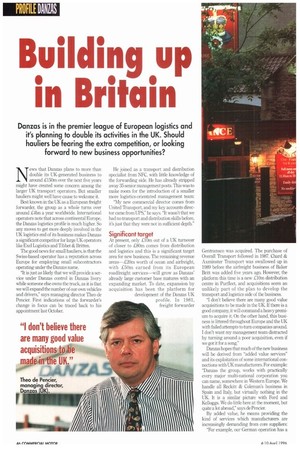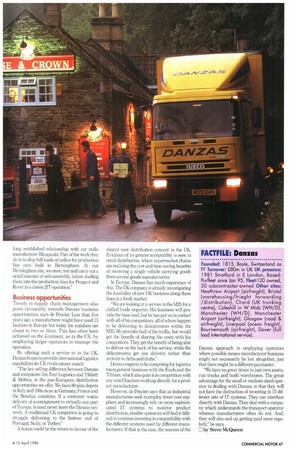Building up in Britain
Page 48

Page 49

If you've noticed an error in this article please click here to report it so we can fix it.
Danzas is in the premier league of European logistics and it's planning to double its activities in the UK. Should hauliers be fearing the extra competition, or looking forward to new business opportunities?
News that Danzas plans to more than double its UK-generated business to around 42150m over the next five years might have created some concern among the larger UK transport operators. But smaller hauliers might well have cause to welcome it Best known in the UK as a European freight forwarder, the group as a whole turns over around .C4bn a year worldwide. International operators note that acmss continental Europe, the Danzas logistics profile is much higher. So any moves to get more deeply involved in the UK logistics end of its business makes Danzas a significant competitor for large CR operators like Exel Logistics and Tibbet & Britten.
The good news for small hauliers, is that the Swiss-based operator has a reputation across Europe for employing small subcontractors operating under the Danzas name.
"It is just as likely that we will provide a service under Danzas control in Danzas livery while someone else owns the truck, as it is that we will expand the number of our own vehicles and drivers," says managing director Theo de Pencier. First indications of the forwarder's change in focus can be traced back to his appointment last October. He joined as a transport and distribution specialist from NFC, with little knowledge of the forwarding side. He has already stripped away 35 senior management posts. This was to make room for the introduction of a smaller more logistics-orientated management team: "My new commercial director comes from United Transport, and my key accounts director came from UPS," he says. "It wasn't that we had no transport and distribution skills before, it's just that they were not in sufficient depth."
Significant target
At present, only 110m out of a LIK turnover of closer to £80in conies from distribution and logistics and this is a significant target area for new business. The remaining revenue areas—k2Orn worth of ocean and airfreight, with £50m earned from its European roadfreight services—will grow as Danzas' already large customer base matures with an expanding market. To date, expansion by acquisition has been the platform for development of the Danzas UK profile. In 1981, freight forwarder Gentransco was acquired. The purchase of Overall Transport followed in 1987. Chard & Axminster Transport was swallowed up in 1989 before the airfreight business of Baker Britt was added five years ago. However; the platform this time is a new £10m distribution centre in Purfleet, and acquisitions seem an unlikely part of the plan to develop the transport and logistics side of the business.
"I don't believe there are many good value acquisitions to be made in the UK. If there is a good company, it will command a heavy premium to acquire it. On the other hand, this business is littered throughout Europe and the UK with failed attempts to turn companies around. I don't want my management team distracted by turning around a poor acquisition, even if we got it for a song."
Danzas hopes that much of the new business will be derived from "added value services" and its exploitation of some international connections with UK manufacturers. For example: "Danzas the group, works with practically every major multi-national corporation you can name, somewhere in Western Europe, We handle all Reckitt & Coleman's business in Spain and Italy, but virtually nothing in the UK. It is a similar picture with Ford and Kellogg-s. We do little here at the moment, but quite a lot abroad," says de Pencier.
By added value, he means providing the kind of services which manufacturers are increasingly demanding from core suppliers: "For example, our German operation has a long established relationship with car radio manufacturer Blaupunkt. Part of the work they do is to ship full loads of radios for production line cars built in Birmingham. At our Birmingham site, we store, test and carry out a small amount of sub-assembly, before feeding them into the production lines for Peugeot and Rover in a classic JIT operation."
Business opporlunities
Trends in supply chain management also point favourably towards Danzas business opportunities, says de Pencier. Less than five years ago a manufacturer might have used 15 hauliers in Europe but today the numbers are closer to two or three. This has often been achieved on the Continent, as in the UK, by employing larger operators to manage the operation.
By offering such a service to in the UK, Danzas hopes to provide international logistics capabilities its UK rivals cannot match: "The key selling difference between Danzas and companies like Exel Logistics and Tibbett & Britten, is the pan-European distribution opportunities we offer. We have 80 plus depots in Italy and 100s more in Germany France and the Benelux countries. If a customer wants delivery of a consignment to virtually any part of Europe, it need never leave the Danzas network. A traditional UK competitor is going to struggle delivering to the bottom end of Portugal. Sicily, or Turkey"
A bonus could be the return to favour of the shared user distribution concept in the UK. Evidence of its greater acceptablity is seen in retail distribution, where supermarket chains are realising the cost and time-saving benefits of receiving a single vehicle carrying goods from several goods manufacturers.
In Europe, Danzas has much experience of this, The UK company is already investigating the feasibility of new UK business along these lines in a fresh market: "We are looking at a service in the M25 for a chilled foods importer. His business will provide the base load, but he has put us in contact with all of his competitors, all of whom happen to be delivering to delicatessens within the M25. He provides half of the traffic, but would get the benefit of sharing the costs with his competitors. They get the benefit of being able to deliver on the back of his service, while the delicatessens get one delivery rather than arrivals in dribs and drabs."
Danzas expects to be competing for logistics management business with the Exels and the Tibbets, which also puts it in competition with any small hauliers working directly for a product manufacturer.
However, de Pencier says that as industrial manufacturers seek to employ fewer core suppliers and increasingly rely on more sophisticated IT systems to monitor product distribution, smaller operators will find it difficult to continue investing in compatibility with the different systems used by different manufacturers. If that is the case, the success of the Danzas approach in employing operators where possible means manufacturer business might not necessarily be lost altogether, just that there might be a different paymaster:
"We have no great desire to just own assets, run trucks and build warehouses. The great advantage for the small or medium sized operator in dealing with Danzas, is that they will not have the distraction of investing in 15 different sets of IT systems. They can interface directly with Danzas. They deal with a company which understands the transport operator whereas manufacturers often do not. And, they will also end up getting paid more regularly" he says.
0 by Steve McQueen
















































































































